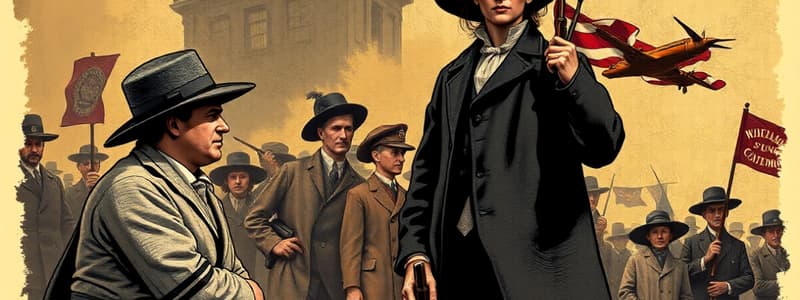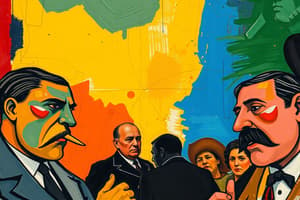Podcast
Questions and Answers
How did muckrakers contribute to the Progressive Era?
How did muckrakers contribute to the Progressive Era?
- By working as government officials to enforce existing laws.
- By directly implementing new labor laws and business regulations.
- By exposing social injustices and prompting public demand for reform. (correct)
- By supporting the economic policies of powerful business tycoons.
What was the primary focus of Jacob Riis's photojournalism?
What was the primary focus of Jacob Riis's photojournalism?
- Exposing the harsh realities of life for working-class Americans. (correct)
- Documenting the living and working conditions of the wealthy.
- Celebrating the achievements of industrial leaders.
- Promoting tourism in American cities.
Which of the following best describes the political climate of the Gilded Age?
Which of the following best describes the political climate of the Gilded Age?
- Marked by widespread political equality and participation.
- Dominated by social reformers and labor activists.
- Characterized by strict government regulation of businesses.
- Largely influenced by wealthy and powerful business leaders. (correct)
What impact did Lincoln Steffens's work have on American society during the Progressive Era?
What impact did Lincoln Steffens's work have on American society during the Progressive Era?
How did Theodore Roosevelt's coining of the term 'Muckraker' affect the journalists of the Progressive Era?
How did Theodore Roosevelt's coining of the term 'Muckraker' affect the journalists of the Progressive Era?
Flashcards
Muckrakers
Muckrakers
Journalists who exposed injustices in the workplace and corrupt business practices during the Progressive Era.
Gilded Age
Gilded Age
A period in the late 1800s marked by significant industrial growth, wealth concentration, and political corruption.
Progressive Era
Progressive Era
A period of widespread social activism and political reform across the United States, from the 1890s to 1920s
Jacob Riis
Jacob Riis
Signup and view all the flashcards
Lincoln Steffens
Lincoln Steffens
Signup and view all the flashcards
Study Notes
- The Gilded Age (1870s and 1880s) was dominated by wealthy business figures like Andrew Carnegie and John D. Rockefeller.
- These industry titans controlled the economy and political arena through business practices.
- Labor unions fought for better working conditions, but big business's power limited reform.
- In 1890, Jacob Riis' "How the Other Half Lives" visually exposed the living and working conditions in New York City, shocking the American public.
The Progressive Era and Muckrakers
- By 1890, the U.S. was ready for major reforms, leading to the Progressive Era.
- Journalists known as "Muckrakers" aimed to expose workplace injustices and business practices to drive reform.
- President Teddy Roosevelt coined the term "Muckraker" in 1906 to describe journalists exposing inequities.
- Muckrakers raised awareness of American industrial workers' struggles, housing conditions, and product quality.
- Their work resulted in significant reforms, many of which are still in effect today.
Lincoln Steffens
- One of the first muckrakers, worked as a journalist in New York City.
- He became managing editor of McClure's, a progressive magazine.
- In 1902, McClure's published his expose, "Tweed Days in St. Louis".
- The article revealed how powerful businessmen and corrupt politicians manipulated the political system.
- His 1904 collection, "The Shame of the Cities," exposed corruption in major cities like New York, Chicago, and Pittsburg.
- Steffen's writing led to public demand for local government reforms.
Ida Tarbell
- After Steffens' success, she began publishing in McClure's.
- Tarbell focused on the business practices of Rockefeller's Standard Oil.
- Her 1904 "The History of Standard Oil" exposed how the Standard Oil trust monopolized the industry.
- As a result of her work, in 1911 the U.S. Supreme Court determined that Standard Oil violated the Sherman Antitrust Act.
- Standard Oil was broken into 34 smaller companies, though Rockefeller still profited from them.
Upton Sinclair
- He sought to expose the dangerous working conditions in the meatpacking industry.
- Sinclair's 1906 book, "The Jungle," was set in a Chicago meatpacking plant.
- The novel highlighted the dangerous working conditions, including workers being injured on assembly lines and body parts being mixed with the meat.
- Readers were more horrified by the poor quality of meat than the working conditions.
- President Roosevelt ordered a federal investigation, confirming the truth of Sinclair's novel.
- In 1906, the Meat Inspection Act and the Pure Food and Drug Act were passed.
- These acts established federal regulations on food produced and sold in the U.S.
- The Food and Drug Administration (FDA) was also established to regulate consumable products.
John Spargo and William Hard
- Spargo examined child labor in the U.S., highlighting the exploitation of children's size to fix machinery and fit in tight spaces.
- His 1906 book, "The Bitter Cry of the Children," exposed child labor in the coal industry.
- Similar to Spargo, William Hard's 1907 "Making Steel and Killing Men" focused on the dangerous steel industry.
- Their publications fueled Progressive calls for better working conditions for industrial workers.
Ray Stannard Baker
- Like Tarbell and Steffens, he began his muckraking career at McClure's, writing under the name David Grayson.
- Baker exposed corruption in the railroad industry and financial institutions.
- In 1908, he published "Following the Color Line," a series of articles covering the struggles of African Americans.
- Baker addressed the racial divide in the U.S., covering topics like lynchings, poverty, and Jim Crow laws.
Studying That Suits You
Use AI to generate personalized quizzes and flashcards to suit your learning preferences.




